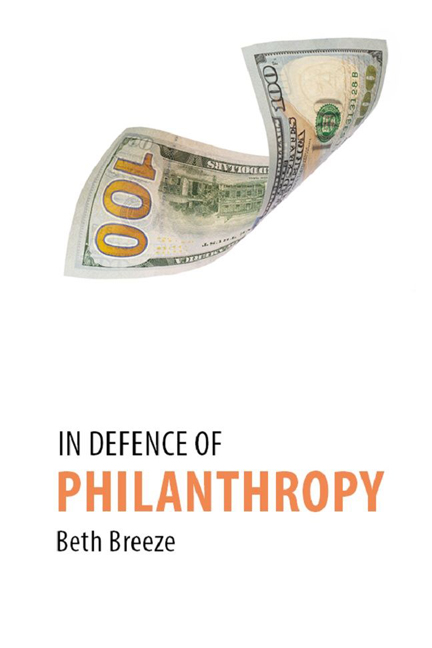Book contents
- Frontmatter
- Contents
- Acknowledgements
- Introduction: the need for a defence of philanthropy
- 1 What is philanthropy?
- 2 Is philanthropy really under attack?
- 3 The academic critique
- 4 The insider critique
- 5 The populist critique
- 6 Why do attacks on philanthropy stick and what can be done about it?
- Conclusion: in praise of philanthropy
- References
- Index
3 - The academic critique
Published online by Cambridge University Press: 22 December 2023
- Frontmatter
- Contents
- Acknowledgements
- Introduction: the need for a defence of philanthropy
- 1 What is philanthropy?
- 2 Is philanthropy really under attack?
- 3 The academic critique
- 4 The insider critique
- 5 The populist critique
- 6 Why do attacks on philanthropy stick and what can be done about it?
- Conclusion: in praise of philanthropy
- References
- Index
Summary
The death of a child is an unthinkable tragedy. A time-honoured way of coping with bereavement and trying to make something positive come from the depths of grief is to create a philanthropic legacy in memory of lost loved ones. In 1884, when Leland and Jane Stanford lost their only child, 15-year-old Leland Jr, to typhoid fever they decided to found a university in his name so that, in Leland Sr's words: “the children of California shall be our children” (Greer & Kostoff 2020: 53– 4). Stanford has become one of the world's top universities, producing over 80 Nobel laureates, one president of the United States (Herbert Hoover) and some of the most noted academics engaged in the scholarly study of philanthropy. Their work is appreciated by fellow philanthropy academics and has helped our subject become one that is taken seriously across the globe. But that body of work, which often argues that philanthropy is undemocratic, an exercise in power and insufficiently concerned about inequality, reinforces the problematization of philanthropy and ironically promotes a much narrower conceptualization of private giving than that expressed in their institution's founding gift.
The academic critique of philanthropy
Academic writing on philanthropy includes descriptive, analytical and theor etical work, and covers a huge range of topics and perspectives, which collect ively have advanced our understanding of the purpose and practice of private action for the public good. But three key concerns recur in this body of work that together constitute what I am calling the academic critique: that philan thropy is not democratic, not concerned about power dynamics and not focused on equality. The foregrounding of negatives is familiar turf for the “nonprofit sector” which, as the name indicates, is defined on the basis of what it does not do – it does not distribute a profit – rather than highlighting what the sector does do and does well. This results in the value and positive potential of philanthropically funded nonprofit action being obscured by a focus on negative characterizations.
Criticisms of philanthropy's undue influence on wider society, lack of accountability and resulting erosion of democratic principles are longstanding (Eikenberry & Mirabella 2017: 43), but are now receiving extensive attention and emphasis in contemporary scholarship, and are landing successfully with public, practitioner and policy audiences who are repeating and amplifying these concerns, which are explained in turn.
- Type
- Chapter
- Information
- In Defence of Philanthropy , pp. 55 - 84Publisher: Agenda PublishingPrint publication year: 2021



